Spirituality and sexuality often clash. These Green Bay churches made the effort to be designated LGBTQ friendly.
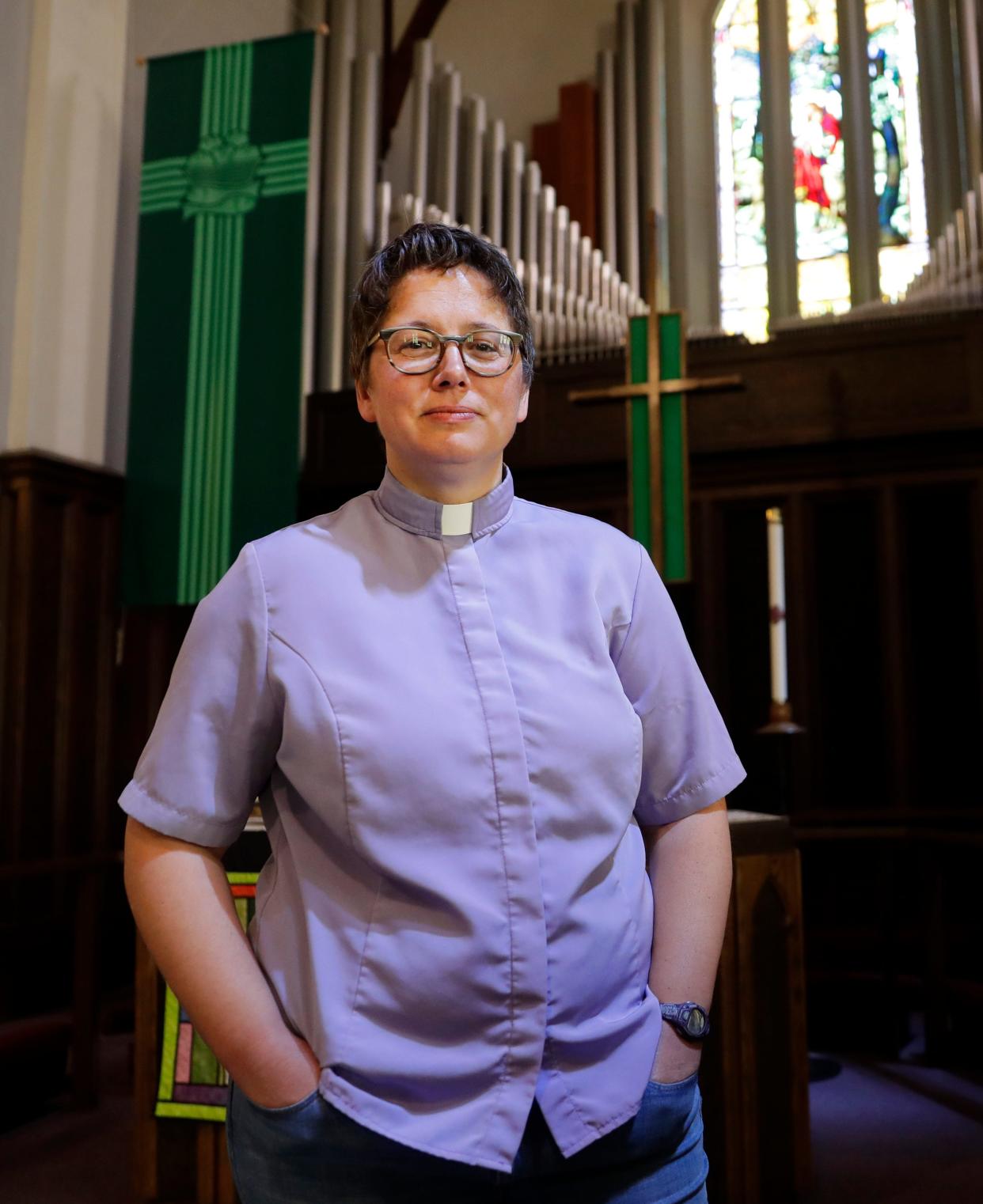
GREEN BAY - Rachel Knoke knows what it's like to have been hurt by the church.
Knoke, 41, first had a call to ministry when she was 15, but it took her another 20 years to accept that call. The church she knew growing up was not a place of solace for her as she was growing into her own queer identity.
“As a gay person, I wanted nothing to do with the church," Knoke said. "The church was a place of judgment and anger."
She went into a career working with adults with developmental disabilities but something about that career path didn’t feel right.
Then she had a moment of prayer where she says she finally came to an acceptance of herself.
"I brought it to God. I was like, ‘I need to be up front and honest: I’m gay. I’m going to be gay,'" she said. "And it was this overwhelming sense of God like, ‘Yeah, I know. I made you.'"
Knoke's journey from feeling shunned and isolated by her faith to one of feeling created and accepted by God is relatable for many in her congregation. She is now the pastor at Trinity Lutheran Church, one of only three Christian churches in Brown County that has earned the title of being "open and affirming."
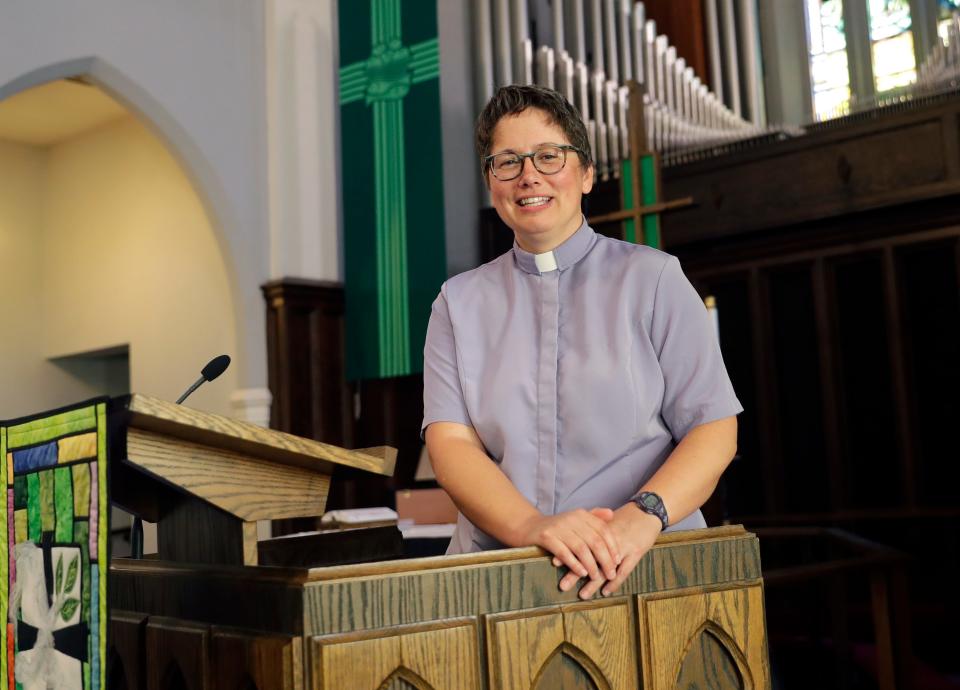
Union Congregational United Church of Christ on South Madison Street in Green Bay and First Congregational United Church of Christ on Cedar Street in De Pere are the other two.
The designation means the church publicly welcomes "into full life and ministry of its church to persons of lesbian, gay, and bisexual orientation," according to Union's open and affirming certificate.
The open and affirming designation isn't arbitrary, nor is it simply proclaimed by a church. It is purposefully sought, requiring the members of a congregation to meet criteria determined by a national governing body in each participating Christian denomination.
Different sects of Christianity call the process different names, but the result is the same — once standards are met, a church is officially determined to be welcoming to its queer members.
Knoke arrived at Trinity Lutheran in 2015 and within a year had led efforts to make Trinity a Reconciling in Christ congregation — the Lutheran process of becoming open and affirming — that means full inclusion of all LGBTQ people is a fundamental value of the church.
“I know what it feels like to be watching from the outside and wondering if this is something I could ever really be a part of," Knoke said. "That makes me mindful of who else is not at the table."
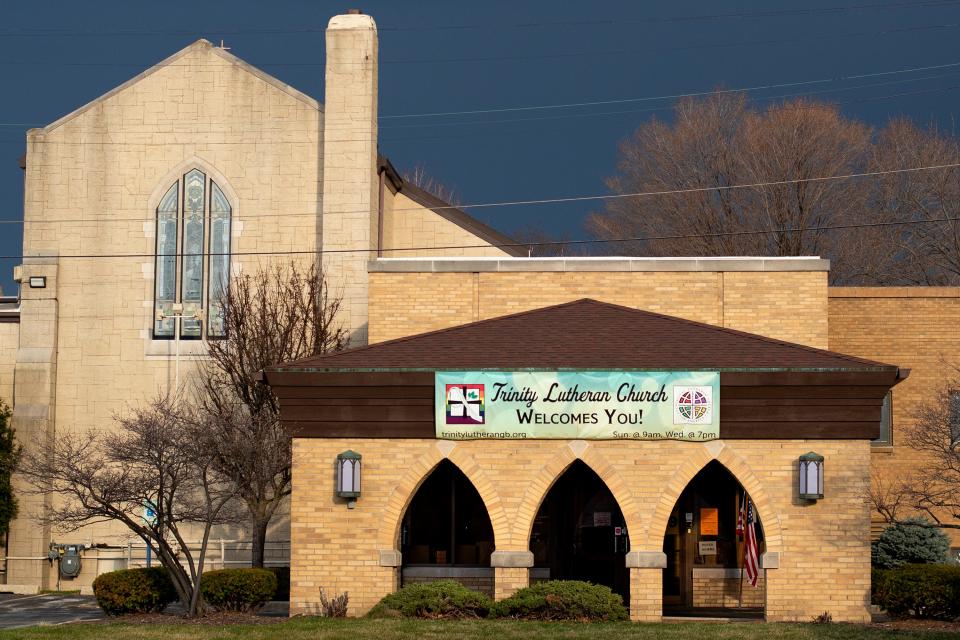
Christian and gay: self-acceptance in the church
In 2009, the Churchwide Assembly of the Evangelical Lutheran Church in America (ELCA) allowed gay and lesbian people who were in relationships to become pastors. Before 2009, they had to vow to be celibate.
The change in policy brought Knoke back to seminary school. She had started her studies, but stopped, the year before.
At the start of their ministry, Knoke and all Lutheran pastors first get assigned to a certain area of the country, where the church thinks they would be a good fit. Pastors also rank their preferences.
Viewing the Upper Midwest as a more conservative region of the country, Knoke ranked it near the bottom of her list.
But what she found when she and her wife arrived in 2015 at Trinity Lutheran was the opposite.
“When we have people around us (in church) who are just themselves, it helps free us to be ourselves,” she said.
Why affirmation matters in the church
That freedom to be yourself is something some members of the LGBTQ community struggle with for much of their lives.
Some, like Connie, who asked her real name not be used to protect her family, found that ability for her and her wife to "just be themselves," as Knoke says, at Union Congregational United Church of Christ.
It immediately felt different from other churches, Connie said. They felt welcomed.
Connie, 65, has been a member of Union since 1999, the same year the congregation voted to become an open and affirming church. Connie grew up attending a Catholic church in Green Bay where things were vastly different, she said. Homosexuality wasn't usually talked about, but when it was, the church's message was clear.
"There was an understanding that being gay was bad and you were not going to heaven. You're probably going to hell," Connie said.
When Connie got to Union, it was the opposite. She and her wife felt supported, clergy celebrated homosexuality in sermons, and LGBTQ families played the modern Holy Family in the Nativity at Christmas.
After decades of searching for a church where she belonged, Connie said, she had finally found her safe haven at Union.
"We are not just tolerated. We're embraced and celebrated," she said.
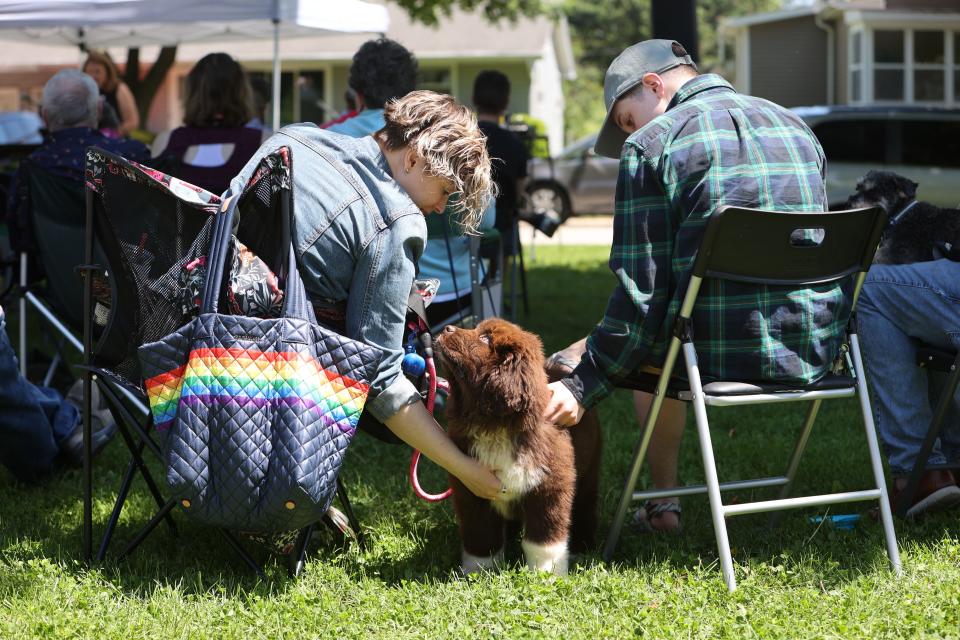
Becoming a safe place of worship
Different denominations have different pathways to making it known they are welcoming to the queer community.
For example, churches that belong to the United Church of Christ denomination can choose to go through the process of getting its Open and Affirming designation, which publicly welcomes everyone's sexual orientation and gender identity into the congregation.
The steps to becoming an open and affirming church is similar to the Reconciling in Christ program in Lutheranism. It includes an educational and reflective process and holding community conversations about what it would mean for the congregation.
Some denominations of Christianity ordain LGBTQ clergy and permit same-sex marriage, but the actual level of affirmation and hospitality for queer Christians changes from congregation to congregation.
Larger denominations including Catholic, Mormon and Baptist churches maintain the belief that LGBTQ people lead lives that contradict biblical principles, ideas that the Human Rights Campaign advocacy group says are oppressive and cause complicated or traumatic relationships with the faith.
"When I hear the word 'Christian', I bristle," Connie said. "In my background, those were the folks who say to you, 'You're going to hell,' They're very judgmental. I will never describe myself that way."
Generally, the open and affirming "covenant" provides more than a statement that claims everyone is part of the church. If the church decides to take the serious steps to take on the designation, it becomes a “sacred promise” for the church, said Union Pastor Bridget Flad Daniels.
"The church has a responsibility that we are affirming because for so long so many churches have been the source of oppression and even direct harm for LGBTQ folks," Daniels said.
To begin the process toward becoming an open-and-affirming church, Union had to have a reflective and educational period involving bible studies, prayer group and public meetings to discuss what it would mean for the congregation and why it’s important. The process culminates with a vote.
Union Congregational Church in Green Bay voted to become an open and affirming church in October 1999. First Congregational United Church of Christ in De Pere has had the title for a few years, said interim pastor Beverly Davis.
It’s not common for churches to put in the work to become a true safe haven for LGBTQ Christians. Among the dozens of UCC churches in northeast Wisconsin, seven have the open and affirming title.
Since becoming an affirming church, Union has had LGBTQ people in almost every leadership role possible from members of the church council, to readers at worship, to Sunday school teachers and youth group leaders.,
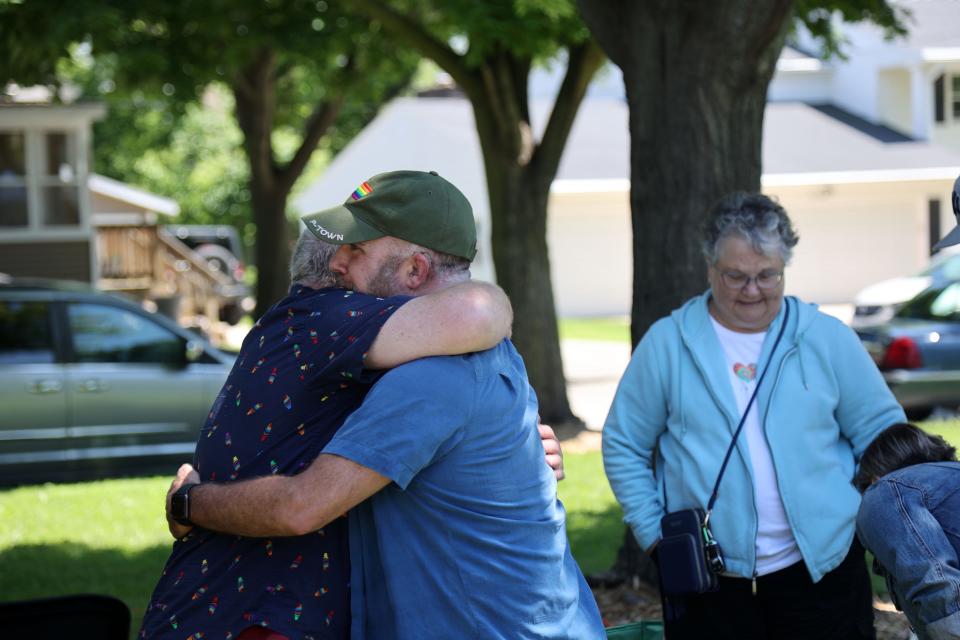
When Trinity voted unanimously to become an Reconciling in Christ church in 2016, its members easily surpassed the requirement that at least 80% of the congregation vote in favor of the designation.
Trinity is the only ELCA Lutheran church in Green Bay to have the classification. In northeast Wisconsin, First English Lutheran Church in Appleton and The 8th Day Project in Oshkosh also hold the designations.
Knoke said a common question that came up during the process of earning the Reconciling in Christ title at Trinity Lutheran made it clear why the process was necessary. Congregation members asked: Isn’t it enough to say the church is welcoming?
“Every single church says all are welcome. How many of them actually mean it?” Knoke would respond. “So many churches — when they say all are welcome, what they really mean is don't ask, don't tell. You are welcome as long as you don't talk about it or make us uncomfortable or make us think about things that make us uncomfortable.”
'Affirmation is something that's felt through experience'
When Sylvia Fager moved to Green Bay last year, the 21-year-old wanted to find a service that openly supported its queer members but was still traditional.
She found her way to First Congregational in De Pere after searching online for places of worship friendly to her community. Fager identifies as transgender.
"I want them to be explicitly affirming because if they don’t explicitly support me, then they’ll also let people in who will not explicitly support me," Fager said.
She grew up attending churches that belonged to the Wisconsin Evangelical Lutheran Synod, which is considered the most conservative group out of the three largest Lutheran denominations in the United States.
It was hard to tell if other churchgoers were accepting of queer and trans people, she said. Consequently, she never felt a sense of spiritual community.
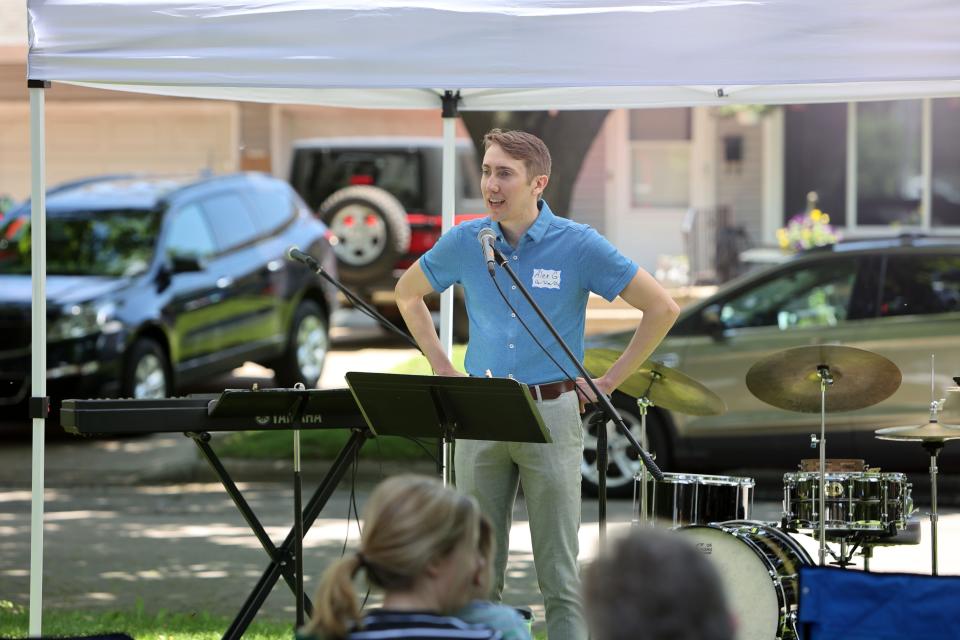
On Sunday, Fager was among dozens of people in attendance at the Imago Dei Pride worship service at Perkins Park in Green Bay.
The outdoor service was cohosted by Union Congregational, Pilgrim Congregational Church, Westside Moravian Church and Christ the King Lutheran Church of Combined Locks.
It was the second year the churches planned the service to celebrate LGBTQ people and to help them feel welcome in their faiths. Many who attended were members of the four congregations, allies and people newer to the area still trying to find where they belong.
Shawn Cushman fits into that last category. They are still looking for their church community as they realize where their faith lies.
Cushman, 21, has been going to services at different churches in Appleton and Green Bay to see which one they identify with best. It takes time to figure out which matches your spiritual needs, they said, and to know if a church that says it's affirming actually practices what it preaches.
A statement on a website that says "we are allied with the LGBTQIA community" only goes so far, Cushman said.
"If you walk in and they’re not using inclusive language, they’re not actively acknowledging the queer people that are in their community regardless of whether those people are expressing their queer identity or not," Cushman said.
"Affirmation is something that's felt through experience," they added. "And actions speak louder than words."
RELATED: For the first time in the city's history, Green Bay raises the Progress flag for Pride Month
Are we missing a church? Let Benita Mathew know at bmathew@gannett.com. Follow her on Twitter at @benita_mathew.
This article originally appeared on Green Bay Press-Gazette: "open and affirming" churches in Green Bay support LGBTQ Christians
